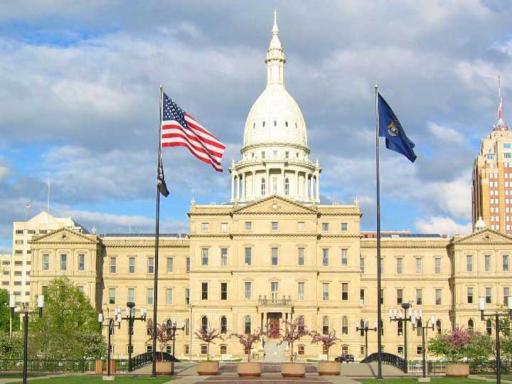The Office of Foundation Liaison: Serving as Conduit Between Philanthropy and the State
Michigan’s Governor’s Office of Foundation Liaison (OFL)operates in a nonpartisan position in the Governor’s administrative offices
Michigan’s Governor’s Office of Foundation Liaison (OFL)operates in a nonpartisan position in the Governor’s administrative offices

Michigan’s Governor’s Office of Foundation Liaison (OFL), the first office of its kind, operates in a nonpartisan position in the Governor’s administrative offices and works to identify and broker innovative funding partnerships and strategic collaborations between the state and philanthropy.
Since it was created in 2003 at the suggestion of Michigan philanthropic leaders, OFL has worked in close partnership with CMF members to advance Michigan’s economic prosperity through reforms in the areas of P-20 education, economic and workforce development and health.
In 2020, OFL’s work pivoted through the challenges of the pandemic and national reckoning for racial justice.
The Dorothy A. Johnson Center for Philanthropy worked with OFL to document how the office served as a critical resource to philanthropy during the pandemic, capturing shared learning that emerged through almost a dozen virtual interviews with state officials and funders from December 2020 to February 2021.
As the pandemic unfolded, OFL quickly adapted to offer real-time virtual briefings for CMF members with Governor Gretchen Whitmer and the department and agency directors from the State Budget Office, Housing Development Authority, Health and Human Services, Labor and Economic Opportunity and Education, serving as a direct conduit for policy updates from the executive branch to Michigan philanthropy.
Neal Hegarty, vice president of programs for the Charles Stewart Mott Foundation and chair of the OFL Advisory Committee (FLAC), shared that OFL was essential in keeping the state and philanthropy connected amid the pandemic, efforts that will continue beyond the pandemic.
“More briefings and more dialogue sessions with state leaders will continue around strategy and about how we can align and strategically leverage each other so that state government and philanthropy are working on the same page,” Hegarty said.
OFL also helped to ensure philanthropy’s voice was represented in several key areas of the state’s work, especially around advancing racial equity. OFL made the connection for a representative from the philanthropic sector to sit on the Coronavirus Task Force on Racial Disparities.
Hegarty shared that this was a different role for OFL.
“The support OFL gave in helping to stand up committees and some of the working groups in the executive office regarding racial disparities and COVID response by reaching into a network within philanthropy was a little different than work in the past,” Hegarty said. “The matchmaking role was different, and I think OFL may continue to serve that role.”
In addition to ensuring philanthropy’s representation in the state’s racial equity work, OFL, in partnership with CMF, worked with foundations that wanted to align their priorities and focus on racial equity.
OFL designed and hosted a series of virtual informational sessions for CMF members centered on racial equity within safety net programs. Through the sessions, CMF members were given actionable roadmaps to infuse key principles of equity into their work and encouraging the state to do the same in its work across departments.
Not only does OFL leverage relationships between philanthropy and the state, OFL can also create connections and opportunities for collaboration among philanthropy.
“The ability for philanthropy to work collectively on an issue with government, as a group of foundations, really unleashes intellectual capital that otherwise might have been isolated. OFL can help collect the common agendas among foundations and to enter the public sector realm with that group of agendas,” Dave Egner, president and CEO of the Ralph C. Wilson Jr. Foundation, CMF trustee and founding FLAC chair said.
Hegarty underscored that OFL is here to serve as a resource for all within our community of philanthropy.
“Anyone who is active in Michigan philanthropy can and should feel comfortable connecting with OFL," Hegarty said. "OFL helps build relationships across foundations and within state government. There are a lot of things that OFL brings to the field but it’s also a place for us (foundations) to bring things to OFL to help navigate state government.”
“The case study should serve as a reminder to philanthropy that OFL plays an important role as translator and broker between the state and philanthropy,” Egner said.
Join OFL and CMF’s P-20 Education Affinity Group for “Reevaluating Early Childhood Education in Michigan” on August 4 as we discuss the state of early childhood in Michigan and how philanthropy can support the system for the future.
OFL is continuing to support learning opportunities and convenings for CMF members engaged in the safety net work and will also host a session on income support and narrative change during CMF’s 49th Annual Conference this October.
Want more?
Learn more about the Governor’s Office of Foundation Liaison.